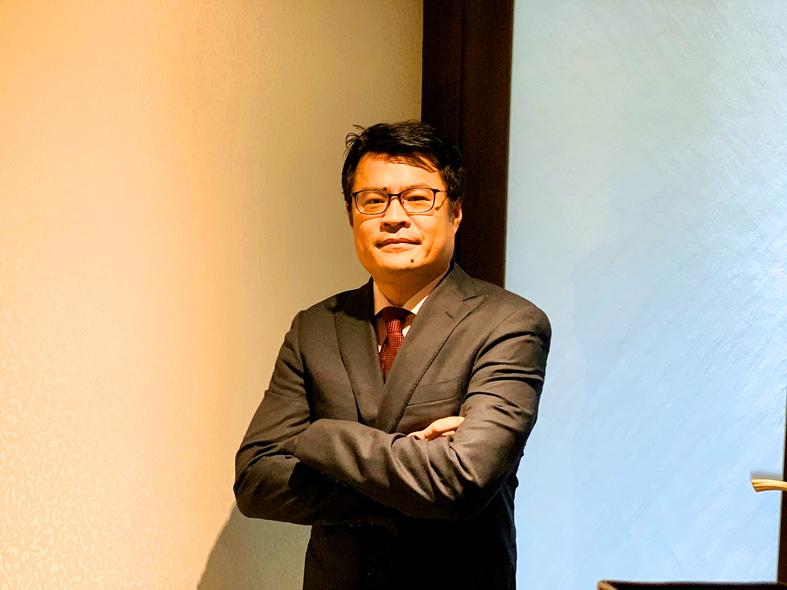Global PMX Co Ltd (智伸科), a provider of dual-clutch transmissions and direct-injection parts for gasoline motors, said that it is cautiously optimistic about its business outlook for next year due to a recovery in the global auto market and the electrification trend.
Sales contributions from the automotive segment account for 60 to 70 percent of the company’s total revenue, the company said in a statement on Friday.
Global PMX said that it is positive about its sales performance next year, given global auto brands’ continuous pursuit for better performing engines, the market’s growing awareness of carbon reduction and saving energy, and the increasing penetration of advanced driver-assistance systems in new vehicles.

Photo: Lin Jing-hua, Taipei Times
Global PMX’s product lineup includes anti-lock braking, electronic stability control, gasoline direct-injection and dual-clutch transmission systems, as well as high-pressure pumps. It also produces components for surgical equipment, and parts used in electronics and sports devices.
For this quarter, the company said that it expects the high-season effect to drive its shipment growth in key auto components, resulting in higher factory utilization at its plants in Taiwan and China.
In particular, as the auto industry increasingly moves toward electrification, reducing carbon emissions and saving energy, its major clients have continued to raise their demand for key components for hybrid vehicles, which would benefit its transmission system business, Global PMX said.
The company’s statement was released after it on Friday reported that its revenue grew annually for the fifth consecutive month last month, rising 7.44 percent to NT$727.79 million (US$25.52 million).
On a monthly basis, revenue increased 8.53 percent, which the company attributed to healthy orders in China after the country’s Golden Week holiday in October.
In the first 11 months of the year, cumulative revenue totaled NT$6.51 billion, down 6.69 percent from the same period last year, as the COVID-19 pandemic disrupted factory production and market demand early this year, the company said.
Global PMX reported net profit of NT$391.65 million in the first three quarters, compared with NT$462.52 million a year earlier.
Earnings per share were NT$4.62 in the nine-month period, down from NT$6.55 the previous year, company data showed.

UNCERTAINTY: Innolux activated a stringent supply chain management mechanism, as it did during the COVID-19 pandemic, to ensure optimal inventory levels for customers Flat-panel display makers AUO Corp (友達) and Innolux Corp (群創) yesterday said that about 12 to 20 percent of their display business is at risk of potential US tariffs and that they would relocate production or shipment destinations to mitigate the levies’ effects. US tariffs would have a direct impact of US$200 million on AUO’s revenue, company chairman Paul Peng (彭雙浪) told reporters on the sidelines of the Touch Taiwan trade show in Taipei yesterday. That would make up about 12 percent of the company’s overall revenue. To cope with the tariff uncertainty, AUO plans to allocate its production to manufacturing facilities in

TAKING STOCK: A Taiwanese cookware firm in Vietnam urged customers to assess inventory or place orders early so shipments can reach the US while tariffs are paused Taiwanese businesses in Vietnam are exploring alternatives after the White House imposed a 46 percent import duty on Vietnamese goods, following US President Donald Trump’s announcement of “reciprocal” tariffs on the US’ trading partners. Lo Shih-liang (羅世良), chairman of Brico Industry Co (裕茂工業), a Taiwanese company that manufactures cast iron cookware and stove components in Vietnam, said that more than 40 percent of his business was tied to the US market, describing the constant US policy shifts as an emotional roller coaster. “I work during the day and stay up all night watching the news. I’ve been following US news until 3am

Taiwan will prioritize the development of silicon photonics by taking advantage of its strength in the semiconductor industry to build another shield to protect the local economy, National Development Council (NDC) Minister Paul Liu (劉鏡清) said yesterday. Speaking at a meeting of the legislature’s Economics Committee, Liu said Taiwan already has the artificial intelligence (AI) industry as a shield, after the semiconductor industry, to safeguard the country, and is looking at new unique fields to build more economic shields. While Taiwan will further strengthen its existing shields, over the longer term, the country is determined to focus on such potential segments as

COLLABORATION: Given Taiwan’s key position in global supply chains, the US firm is discussing strategies with local partners and clients to deal with global uncertainties Advanced Micro Devices Inc (AMD) yesterday said it is meeting with local ecosystem partners, including Taiwan Semiconductor Manufacturing Co (TSMC, 台積電), to discuss strategies, including long-term manufacturing, to navigate uncertainties such as US tariffs, as Taiwan occupies an important position in global supply chains. AMD chief executive officer Lisa Su (蘇姿丰) told reporters that Taiwan is an important part of the chip designer’s ecosystem and she is discussing with partners and customers in Taiwan to forge strong collaborations on different areas during this critical period. AMD has just become the first artificial-intelligence (AI) server chip customer of TSMC to utilize its advanced